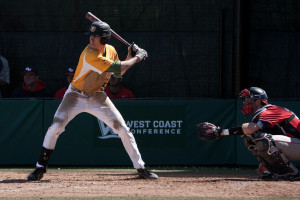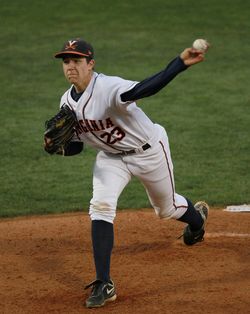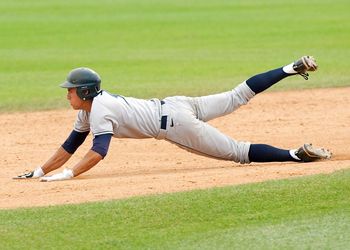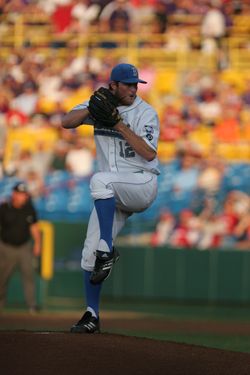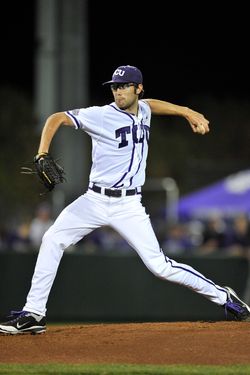Draft Prospect Q&A: Bradley Zimmer
MLBTR is re-launching its Draft Prospect Q&A series this season in order to give our readers a look at some of the top names on the board in this year’s draft. MLBTR will be chatting with some of the draft’s most well-regarded prospects over the next couple of weeks as they prepare for the 2014 draft on June 5-7.
University of San Francisco center fielder Bradley Zimmer is considered by some to be the best college position player in this year’s draft. The brother of Royals prospect and 2012 No. 5 overall pick, Kyle Zimmer, Bradley is ranked as the fifth-best prospect in this draft class by ESPN’s Keith Law (ESPN Insider subscription required and recommended). Baseball America has Zimmer ranked 14th, and MLB.com currently ranks him No. 10.
The 6’5″, 205-pound Zimmer put himself on the prospect map with an outstanding sophomore season in 2013 when he slashed .320/.437/.512 with 29 walks with seven home runs against just 31 strikeouts in 58 games.
He’s followed up that breakout campaign with an even more impressive .368/.461/.573 batting line to go along with seven homers, seven triples and 10 doubles. Once again, he’s walking (31 times) almost as often as he strikes out (34), and he’s swiped 21 bases in 32 tries in 2014. Bradley was kind enough to take some time out of his busy schedule to talk with MLBTR last week:
Chase Lambin Q+A
At 34, infielder Chase Lambin is the oldest current minor-leaguer who hasn't yet played in the Majors. Drafted in the 34th round in 2002 as a college senior, he faced an uphill climb even to make it to the upper levels of the minor leagues, but more than a decade later, he's played at the Triple-A level for the Mets, Marlins, Nationals, Twins and Royals organizations. He has also played for the Chiba Lotte Marines in Japan, and in independent baseball. He is currently a free agent. MLBTR recently spoke to him about his career as a minor-leaguer, and about trying to break into the big leagues. This interview has been edited for length.
When did you feel like you got the closest to the big leagues?
Probably '05. I was still with the original team that drafted me [the Mets]. I was having my best year, and I got called up halfway through the year to Triple-A. I was 25 years old, I was playing as well as I ever had, and I thought it might happen then. But then the next spring training — actually I wasn't in big-league camp. I got called over a couple times from minor-league camp and ended up getting like 30 at-bats because the World Baseball Classic was going on, and I did really well. [Then-Mets manager] Willie Randolph was like, "We really like you, but we don't have a spot for you right now. Go do your thing in [Triple-A] Norfolk, and we'll see you soon." And I went to Norfolk and batted like .180 the first two months (laughs). So I kind of blew it.
What is it like to go through the minors as a 34th-round pick, as compared to if you were, say, a second-round pick?
I'd say the incline is a lot more steep. There's less room for error. The window of opportunity is much smaller. I didn't get much [of a] chance when I first got to Brooklyn in short-season, but once I did get some at-bats I did well, which bought me some time. And then the next spring training, I actually caught a couple breaks, and they had an opening at shortstop in high-A, so I skipped low-A completely. So I was playing every day for HoJo [Howard Johnson]. HoJo was my manager in Brooklyn, and I think he stuck his neck out for me and gave me an opportunity, and I ended up being an All-Star. I had that first year and a half to really impress, and I did, which let me hang around. But if I [hadn't], I would have been out a long time ago.
What's it like waiting to be picked?
For me, it was tough, just because I was eligible every year. It wasn't just my junior year and senior year in college. I was eligible my senior year in high school, and then I went to junior college, so I was eligible after both of those years. So for four or five years in a row, I was able to be drafted. And I was told I had a chance, so I kind of frustrated because I thought I would be, and then I wasn't. It ended up working out for the best. I had four awesome years in college that I really needed, because it took me a while to come into my own as a player.
What do you see yourself doing when you're done playing?
I see myself coaching. I feel like I have a gift to get on the same level with hitters. I feel like I can help guys with their plan and their mentality.
As an older player in the minors, do you feel like you're helping your teammates now?
Yeah. The last few years, I've really embraced it, mainly because I wasn't playing every day, so I had to take the focus off that, and just make the most of it. It was surprising to me how rewarding it was to really help a guy and see him do well. I felt like I was in the box getting the hit.
Is it frustrating to see younger players get promoted?
Of course, when I was younger, it was probably more frustrating, just because of my ego. You just always feel like it should be you. But over the years, you shift your perspective, and I got to the point where I was just trying to support a family, and I was grateful that I had a job, that I got to be playing baseball at age 32, 33, 34. You can really get bitter if just sit and think about how you're not getting what you think you deserve. I'm happy for my teammates who get called up. I always pray that it will be me next, but I just decided to focus on the positive.
If the opportunity to play in the Majors didn't exist — if you were just doing what you do without the possibility of playing in the Majors, with all the travel you do and the salary you make — is that a lifestyle that's sustainable on its own?
Yeah, yeah. I'd play as long as my body would let me if I could support my family. Of course, that carrot you're chasing is always good motivation, but if you told me there was a zero percent chance of going to the big leagues [but] that I could still play baseball and support my family, I'm pretty sure I'd still do it. That's pretty much what I've been doing the past few years. I really enjoy playing baseball and traveling. It's gotten tougher now that we have children, but my wife loves the game, and loves to travel and support me.
How did you end up in Japan in 2009?
I had multiple options from different teams. I got an international agent in the middle of the 2008 season [who] called me out of nowhere and said he had some connection to Japan if I was interested. That offseason, it was like, "I can get you a workout in front of Bobby Valentine in Japan if you want to go." I was like, "Sure, why not?" I just decided at my age, and [with] my financial situation, it would be dumb to pass up guaranteed, good money and a chance to have a great life experience. We went and had an amazing time. We were married right before we left, [so] we were newlyweds in Japan. It didn't work out the way I envisioned — I only got 100 at-bats. [But] I would've gone back, and I'd still go back, in a heartbeat.
Now that you're back here, what is the process of looking for minor-league opportunities like? Is that something you leave to your agent, or is that something you pursue on your own?
When I was younger, I just would lean on my agent, but as I've gotten older I've gotten a little more proactive. I've developed a network of connections that I email and call, and try to just get in people's ears. My agent is still working for me, but I do my own work. I don't know how much it helps or not, but I feel better about doing everything I can. With my age and no big-league experience, it's a tough sell, but I think there's value in guys like me who can provide production at multiple positions, switch-hit, and also be a good mentor. It takes a lot of things to shake out, because on the totem pole, I'm the low man, so everybody else usually has to get signed, and then if there's any extra spots, that's where I fit in. So I've got to be patient.
You feel like something might develop for you when spring training starts, or something like that?
It's hard to say. I think so. I'm an eternal optimist. All I can do is be ready to play when I get that call.
C.J. Nitkowski Q+A
Lefty pitcher C.J. Nitkowski's fascinating career began when the Reds drafted him in the first round in 1994. From there, he pitched in the Tigers, Astros, Mets, Cardinals, Rangers, Yankees, Braves, Pirates and Nationals organizations, also pitching in a number of Triple-A towns along the way, before playing in Japan and then Korea. With big-leaguers like Kevin Youkilis, Luis Mendoza, Chris Volstad and Luke Scott now heading overseas, and Japanese ace Masahiro Tanaka in the process of signing with a North American team, Nitkowski's unique perspective seems more timely than ever. Nitkowski's career ended in 2012, and he currently works as an analyst for MLB.com, CBS Sports and MLB Network Radio. He can also be found on Twitter. This interview has been edited for length.
MLBTR: What is it like to have to [bounce around] from year to year and not know where you're going to be?
CJN: I really thought my career was over in 2002, and it didn't end until last January, so I always felt I was on borrowed time anyway. [And] at least early on, for me, I always felt like I was still going to be in the game. It's just a matter of where you're going to be. It wasn't that bad. It was probably harder on my wife, as far as the travel goes, or getting released suddenly. I just kind of got used to it, to be honest with you. I think, probably because I was traded my first full year — I was drafted by the Reds in '94 and traded at the deadline in '95, so right away, I was on that carousel. Almost immediately in my career, I was used to moving around. I never got frazzled by it. If anything, the stress level would have been on her, just because she had the kids, and a lot of times she was doing things by herself, and moving by herself. But for me personally, I'd gotten so accustomed to it.
As a Triple-A player, how do you follow big-league baseball? Do you look for situations where you might be able to help?
Oh, sure, especially [when] I was older. When you're younger, you're in an organization, you're paying attention to what's going on up top, and you kind of know what your opportunities are going to be. Your job is just to make sure that you're ready. But as you get older, if you're fortunate enough to get an out clause in your contract, which I had a bunch toward the end of my career, then you're paying attention to everything that's going on.
Some guys completely leave that stuff up to their agent, and aren't involved. [But] I was always proactive, especially in the second half of my career, making sure I really knew what was going on in different organizations, and where I thought there were needs and where I could sell myself as a potential fit. Having that out clause was big, just because you see what's going on, you say, "Wow, there's a team that really has a need right now," and you try to use that to your advantage. A good agent should be on top of it, but I always tell guys, especially when you're in the minor leagues and you're older, there's not a lot of benefit for your agent. It's more work than it probably is worth. So you really need to be proactive and take a little more control of your career. I was always a guy who did that, and there were quite a few times when it worked for me.
Like what?
When I was with the Pirates in '05, I was pitching really well in Triple-A, probably the best I've pitched, and really just paying close attention to what was going on. [I] saw the Nationals had a need, and we were able to work something out where I had my out clause and went to pitch for them. When I got released by the Braves in '04, [I] called the Yankees myself, because I realized they had a need. I was on a guaranteed contract with the Braves anyway, so I knew I was going to get a big-league salary the rest of the year. I called them, and they called me back, and within a couple hours, they said, "Yeah, it's a good fit." I knew what was going on there.
What do you think organizations owe people who are in your situation, Triple-A veterans who might see opportunities in other organizations?
It can be frustrating, because if you don't have the out [clause], you're sitting there going, "Ugh, I cannot believe I decided to sign with this team, and gosh, if I were in that organization right now, of course I would get a callup." [You don't] know whether you actually would or not, but you believe you would've. You see an opportunity with other teams in the big leagues, and you might see it as, "They have nothing in Triple-A." And here you are, pitching great for an organization that doesn't have opportunities, or an organization that just doesn't particularly see you as a guy that they're going to make a move with.
A lot of times, guys will feel like they've been lied to or misled [by] organizations that want to stockpile some older veterans. Which we don't see as much as we used to. But there would be teams that would just want to get a bunch of veteran guys around, and then kind of hold onto them. It can be really frustrating when you feel like you're doing a good job, or you feel like you're absolutely ready to go back to the big leagues or get to the big leagues, but you can't get out. I've always told guys to be very careful, when you become an older guy, about where you sign, and what organization you sign with.
It's a really good idea to talk to other players, and see how their experience went with a front office. I remember a good buddy of mine — two years in a row, he'd call me and ask me about organizations, and both times, I told him not to sign with them, because I had a bad experience [with] the front office, and both times, he did it anyway. And both times, he called me in the middle of the year, going, "I can't believe I'm stuck in this organization." I said, "Man, I told you." You're in your mid-30s in Triple-A. That was not a place you want to be. Even though it might look like there was opportunity up top, it's not the right spot. You look around, you pay attention, you talk to other guys, make sure you get an organization where you feel like you'll be treated like a professional.
A lot of players who take opportunities overseas [wouldn't] be starters in the big leagues, but might be just an injury or two from being starters in the big leagues. What is it like to have to make that decision between going overseas and having to wait for an opportunity that might [present itself] in the US?
Jamey Carroll Q&A
Yesterday I had a chance to talk with Dodgers infielder Jamey Carroll. Click below to read his preferences in free agency, how he's affected by the Dodgers' ownership situation, and what he was thinking facing Trevor Hoffman in the Rockies' 2007 tiebreaker game against the Padres.
Draft Prospect Q&A: Anthony Rendon
As the 2011 Draft draws closer, MLBTR will be introducing you to a handful of the top eligible prospects with a series of Q&As. The series includes four of the top college pitchers in the nation and a top college position player. Here's another position player to watch.
Rice third baseman Anthony Rendon is considered the top college position player in the 2011 draft and he remains a candidate to be the first overall pick this June. Both Baseball America and ESPN.com have reported within the week that it appears Rendon will either go first overall (to the Pirates) or second (to the Mariners) with UCLA right-hander Gerrit Cole going to the other team.
Rendon entered the season as the top prospect in the draft after being named Baseball America's Player of the Year in 2010 and the publication's Freshman of the Year in 2009. Ankle and shoulder injuries have slowed Rendon down this year and limited his time at third base, where he is considered an excellent defender. The 20-year-old Houston native shines at the plate as well and has a .350/.552/.552 line with 62 walks so far this season.
I spoke to Rendon earlier today about his injuries, the team he rooted for growing up and the hype surrounding the draft. Here's a transcript of our conversation:
Draft Prospect Q&A: Danny Hultzen
As the 2011 Draft draws closer, MLBTR will be introducing you to a handful of the top eligible prospects with a series of Q&As. The series started with three of the top college pitchers in the nation and a top college position player. Here's another arm to watch.
Danny Hultzen was the ACC pitcher of the year and a semi-finalist for the Golden Spikes Award last year, but even he is a little surprised by how well the 2011 season is going. The Virginia left-hander has helped lead the Cavaliers to a 36-3 record and the top ranking in the country thanks to his arm and his bat.
Baseball America's Midseason Player of the Year is climbing up draft boards and may be the third-best draft prospect in the country behind Anthony Rendon and Gerrit Cole. ESPN.com's Keith Law reported last week that the D'Backs, Orioles and Royals are among the teams eyeing Hultzen. Anyone picking much later on can likely forget about him, since he doesn't figure to be available for long.
Earlier today I spoke to the 21-year-old about his team's title hopes, his two-way play and the draft. Here's what he had to say:
Draft Prospect Q&A: George Springer
As the 2011 Draft draws closer, MLBTR will be introducing you to a handful of the top eligible prospects with a series of Q&As. The series started with three of the top college pitchers in the nation and continues today with a college position player.
Teams looking for powerful outfielders with speed to spare will be intrigued by George Springer of the UConn Huskies. The 6'4" 21-year-old has improved his draft stock dramatically since the Twins selected him in the 48th round of the 2008 draft; Springer is now a projected first round pick.
In its college baseball preview, Baseball America described Springer as one of the nation's best power hitters, who's a superb defender and a "plus-plus" runner to boot.
He hit 18 homers with 33 steals, 60 walks, 84 runs and a .491 on-base average last year, prompting ESPN.com's Keith Law to rate him second among eligible prospects last month. Law described Springer as "an athletic outfielder with an above-average arm who projects to hit and hit for power and just needs to refine his approach, especially with two strikes."
Springer started slowly and some said to ESPN that he changed his mechanics. After collecting just three hits in his first six games (22 at bats), Springer appears to have rediscovered his stroke, as his numbers are on the rise.
He spoke with MLBTR after UConn's loss to Sacred Heart today. Here's what he had to say:
Draft Prospect Q&A: Gerrit Cole
As the 2011 Draft draws closer, MLBTR will be introducing you to a handful of the top eligible prospects with a series of Q&As. The series started with two of the top college pitchers in the nation and continues today with another one.
UCLA right-hander Gerrit Cole was one of the top draft prospects in the country before last week, but his performance against Nebraska on Friday sure didn't hurt his stock. Cole pitched nine innings of two-hit, shutout ball, taking a perfect game into the seventh inning and striking out eight.
It's not particularly surprising to see the 6'4" 20-year-old thriving. Baseball America announced earlier in the year that his mid-90s fastball and devastating slider give him "best pure stuff in the [2011] draft" and Cole struck out 153 batters in 123 innings last year, helping the Bruins reach the College World Series finals.
Cole has been a known commodity for years, since the Yankees selected the power pitcher in the first round of the 2008 draft out of high school. He will likely go higher than 28th overall in 2011; ESPN.com's Jason A. Churchill and Keith Law suggested last week that Cole is a threat to surpass Anthony Rendon and go first overall this June.
MLBTR chatted with Cole about his most recent outing, turning down the team his family cheers for and having Charlie Sheen show up at his team's practices. Click through to read our conversation:
Draft Prospect Q&A: Matt Purke
As the 2011 Draft draws closer, MLBTR will be introducing you to a handful of the top eligible prospects with a series of Q&As. The series debuted last week with one of the top college pitchers in the nation and continues today with another.
Matt Purke pitched well enough as a high schooler to go in the first round of the 2009 draft. He didn't sign with the Rangers, who selected him 14th overall, and instead joined the TCU Horned Frogs. He led the team to its first ever College World Series appearance last year with a shiny 16-0 record and 142 strikeouts in 116 innings.
The 20-year-old sophomore is draft eligible once again and, according to Baseball America and ESPN.com's Keith Law, should go in the first round once again, possibly first overall. Baseball America called Purke "a bona fide ace with a lively 91-94 mph fastball and a wipeout slider" that can overmatch hitters. Purke calls his breaking ball a curve, but he isn't going to get into an argument about semantics with the publication that named him the 2010 Baseball America Freshman of the Year.
Purke talked to MLBTR this afternoon. Here's what we discussed:
Draft Prospect Q&A: Sonny Gray
As the 2011 Draft draws closer, MLBTR will be introducing you to a handful of the top eligible prospects with a series of Q&As. The series debuts today with one of the top college pitchers in the nation.
Vanderbilt right-hander Sonny Gray has "the best curveball in college baseball," according to Baseball America, and ESPN.com's Keith Law suggested last week that he has an outside shot of being the first overall pick this June. According to Baseball America, some scouts wonder if Gray's future is in the bullpen. But with an above-average curve, a 93-96 mph fastball and a change-up, he could become a starter like Mike Minor and David Price, two Vanderbilt products who were selected in the first round.
Gray talked to MLBTR about his size, his curveball and Roy Halladay. Here's a transcript of our conversation:

